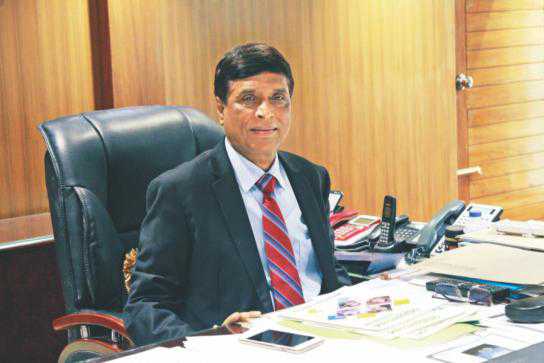Banking loopholes limit potential of stockmarket

Bangladesh's stockmarket is being held back from reaching its potential because of the indiscipline in the banking sector, which has spoiled companies' attitude, said M Khairul Hossain, chairman of the Bangladesh Securities and Exchange Commission (BSEC).
To raise funds from the public, only submission of financial reports is required, he said.
But big companies prefer to go to banks for their financial needs to avoid complying with the rule of having transparent financial transactions and maintaining corporate governance, he told The Daily Star in an interview yesterday.
“Stricter banking rules should be introduced now to punish the defaulters, so that the big companies are encouraged to come to the stockmarket for future financing.”
As is practice, unethical businesses take huge loans from banks and avoid paying them back by getting stay orders from court on their defaulter status.
Although banks take huge collateral against the loans, they cannot confiscate the property because of the stay order.
“Besides, in Bangladesh we cannot compel multinational companies to come to the stockmarket due to lack of rules. But in India it is mandatory for every multinational to be listed with stockmarket if it wants to do business in that country.”
The existing rule of giving 10 percent tax benefit to every listed company has failed to attract the global firms, he said.
“The global firms show reluctance because of the mandatory rule of maintaining transparent financial statement to be listed.”
Subsequently, he advised the government to introduce stricter rules to bring multinational and local government firms to the capital market.
The capital market regulator is holding conferences at the district level across the country to raise awareness about the benefits of raising funds from the stockmarket.
“It is easy to raise funds from the stockmarket. No interest, no collateral and less risk will be attached with the fund. They will enjoy some tax benefits too.”
Hossain, who took charge of the commission in May 2011 when the government had to go for massive reforms because of the stockmarket crash in 2010, said the initiative is paying off well for the BSEC.
In the last seven years, the regulatory standards and laws have improved a lot, he said.
In December 2013, the International Organisation of Securities Commissions (IOSCO) awarded the BSEC with the 'A' category regulatory agency status -- a global acclaim as the US stockmarket regulator also belongs to the group, he said.
The IOSCO is an association of organisations that regulate the world's securities and futures markets.
Venture capital -- which is a financing that investors provide to startup companies and small businesses that are believed to have long-term growth potential -- has huge potential in Bangladesh, he said.
The commission introduced rules and regulations for venture capital funds in 2015, and 37 companies have so far been established through such fund under the ICT ministry, according to Hossain.
The rise of venture capital firm will generate huge employment and help the stockmarket to increase its contribution to the country's gross domestic production, he said.
In America, 14 percent employment comes from the venture capital industry.
The registration of venture capital firms increased significantly last year in Bangladesh, with the number expected to hit 100 by the end of 2018, he said.
At present, the market is equity based and the BSEC is trying to change that by introducing new conceptual funds like venture capital, private equity and impact.
By December, the regulator will launch a separate trading board in the stockmarket for firms with capital less than Tk 30 crore, he said.
Numerous opportunities will open up when small venture capital firms enter the stockmarket. Many new foreign investments will come for such firms, he said.
The BSEC also initiated a financial literacy programme for inclusion in the curriculums of schools and colleges.
“In Sri Lanka, investment education is already included in their curriculum and India also took initiative.”
In the investment education syllabus, students will learn about finance, money market, capital market and so on.
The BSEC has also developed a strong surveillance system to prevent price manipulation, he said.
At present, the unusual price hike of shares on its first trading day has become a headache for the BSEC.
“We are now thinking of introducing a circuit breaker for every share from its first day of trading.”
Source: https://www.thedailystar.net